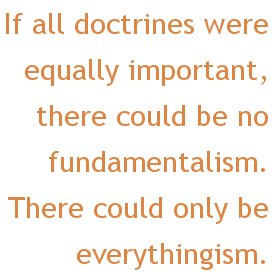Albert Mohler on Doctrinal Triage: A Response
 BP News is the official press of the Southern Baptist Convention. In a recent “First‐Person” article (August 23, 2006), Albert Mohler issued “A Call for Theological Triage and Christian Maturity.” The article, which has been posted twice on Mohler’s own blog, reiterates an argument that he has repeated in several venues. It is an important argument, and Mohler expresses it thoughtfully.
BP News is the official press of the Southern Baptist Convention. In a recent “First‐Person” article (August 23, 2006), Albert Mohler issued “A Call for Theological Triage and Christian Maturity.” The article, which has been posted twice on Mohler’s own blog, reiterates an argument that he has repeated in several venues. It is an important argument, and Mohler expresses it thoughtfully.
Mohler’s thesis is that theological issues vary in importance, and that the level of importance affects the levels at which Christian fellowship is possible. Most important are “first‐order” doctrines. These teachings are the “most central and essential to the Christian faith.” They represent the “most fundamental truths of the Christian faith.” Indeed, “a denial of these doctrines represents nothing less than an eventual denial of Christianity itself.” Among them, Mohler lists “the Trinity, the full deity and humanity of Jesus Christ, justification by faith, and the authority of Scripture.” Second‐order doctrines involve issues that create significant boundaries among believers, but that do not keep them from recognizing each other as Christians. Mohler believes that the debate between pedobaptists and credobaptists is an example, as are questions about the ordination of women. He notes, “Many of the most heated disagreements among serious believers take place at the second‐order level, for these issues frame our understanding of the church and its ordering by the Word of God.”
Second‐order doctrines involve issues that create significant boundaries among believers, but that do not keep them from recognizing each other as Christians. Mohler believes that the debate between pedobaptists and credobaptists is an example, as are questions about the ordination of women. He notes, “Many of the most heated disagreements among serious believers take place at the second‐order level, for these issues frame our understanding of the church and its ordering by the Word of God.”
Third‐order doctrines are those over which Christians may disagree while remaining in close fellowship. Mohler names the debate over the timing of events surrounding the Lord’s return as an example of a third‐order dispute. Differences over such doctrines should not prevent believers from accepting one another “without compromise,” even in local church membership.
These three categories provide Mohler with a neat taxonomy for questions of fellowship. Third‐order disagreements should never affect Christian fellowship or cooperation. Second‐order differences may block cooperation at some levels, but should not bar Christians from expressing mutual recognition. Differences over first‐order doctrines—well, Mohler does not express an opinion here.
He does insist that Christians should never take doctrine lightly. He argues, “We are charged to embrace and to teach the comprehensive truthfulness of the Christian faith as revealed in the Holy Scriptures.” Mohler’s view could be summarized by saying that all doctrine is important, but some doctrines are more important than others.
Why is this remarkable?
For one thing, Mohler’s position approaches that of historic fundamentalism. The genius of fundamentalism is the recognition that all doctrines are not created equal. All are important, but all are not equally important. If all doctrines were equally important, there could be no fundamentalism. There could only be everythingism.
Historic fundamentalists have also insisted that degrees of doctrinal importance affect levels of fellowship. No Christian fellowship at all is possible with those who deny fundamental doctrines, for (as Mohler observes) the denial of a fundamental “represents nothing less than the eventual denial of Christianity itself.” Even among those who affirm the fundamentals, varying levels of doctrinal commonality will lead to varying degrees of cooperation and fellowship.
This principle was worked out historically in the American Council of Christian Churches, which could claim to speak for mainstream fundamentalists at least into the 1970s. From its founding in 1941, the ACCC has always repudiated any form of Christian fellowship or cooperation with those who deny the fundamentals. Nevertheless, it was able to bring together Baptists, Presbyterians, Bible churches, Methodists, and other traditions (such as the Tioga River Christian Conference). These various groups recognized one another as truly Christian, and they were able to unite in accomplishing the purposes of the ACCC, but only because the ACCC has studiously avoided all endeavors that would have required the compromise of “second‐order” (to use Mohler’s taxonomy) doctrines and practices, such as denominational distinctives. In the ACCC, all three levels of Mohler’s doctrinal triage were functioning—and, incidentally, they still are.
Therefore, it comes as a considerable surprise to see Mohler asserting, “The misjudgment of true fundamentalism is the belief that all disagreements concern first‐order doctrines. Thus, thirdorder issues are raised to a first‐order importance, and Christians are wrongly and harmfully divided.” While this may be a description of some fundamentalists (hyper‐fundamentalists would be a better label), it certainly does not characterize either the fundamentalist ideal or the mainstream organizations of the fundamentalist movement. On the contrary, prominent fundamentalist leaders have repeatedly insisted that all doctrines must not be treated as if they were fundamental. A good example is Rolland McCune’s article, “Doctrinal Non‐Issues in Historic Fundamentalism,” Detroit Baptist Seminary Journal 1 (Fall 1996): 171‐185.
If anything, historic fundamentalists have recognized a more complex doctrinal calculus and a more nuanced understanding of fellowship than even Mohler has requested. Mohler thinks that differences about eschatological timing should not affect Christian fellowship. Many fundamentalists (and, for that matter, many evangelicals) have recognized that these disagreements may entail real differences in the way that the Christian life is lived. Such differences do place a strain upon fellowship at some levels. When our understanding of the Bible differs, we must either limit our message or limit our fellowship, but only at whatever levels are affected by the difference.
To offer another example, Mohler is known for his Calvinism. While he does not say so, I suspect that he would classify limited atonement as a third‐order doctrine. I cannot imagine that he would refuse to be a church member with someone who did not share this view. Yet, Mohler’s Calvinism could find legitimate expression in Christian enterprises dedicated to exclusively Calvinistic concerns. Those enterprises would be less than church membership but more than simple, individual fellowship. If this is so, then a genuinely mature doctrinal triage will have to be even more subtle than Mohler himself has acknowledged.
Given the excellence of his argument, it is disappointing that Mohler does not say more about the effects of first‐order disputes upon Christian fellowship. He does observe that first‐order denials represent “nothing less than an eventual denial of Christianity itself,” but he does not say what we ought to do about people in Christian organizations who deny fundamental doctrines.
I suspect that Mohler cannot address this question. If he recognizes the deniers as fellow‐Christians with whom he ought to fellowship, then he has to explain how first‐order doctrines rate a separate and more advanced importance. On the other hand, if he really means what he says—if a denial of the fundamentals is a denial of Christianity—then he needs to explain why more is not being done to eradicate the deniers from the Southern Baptist Convention.
The position that Albert Mohler articulates is about four‐fifths of the way to fundamentalism. Of course, I’m a tad disappointed that he does not seem to have a more clear idea of what fundamentalism is. Still, the overall thrust of his argument is sound. He is furthering a conversation that greatly needs to be continued.
Untitled
Thomas Traherne (1636‐1674)
Sin!
O only fatal woe,
That mak’st me sad and mourning go!
That all my joys dost spoil,
His Kingdom and my Soul defile!
I never can agree
With thee!
Thou!
Only thou! O thou alone,
And my obdurate heart of stone,
The poison and the foes
Of my enjoyments and repose,
The only bitter ill,
Dost kill!
Oh!
I cannot meet with thee,
Nor once approach thy memory,
But all my joys are dead,
And all my sacred Treasures fled
As if I now did dwell
In Hell.
Lord
O hear how short I breathe
See how I tremble here beneath
A Sin! Its ugly face
More terror, than its dwelling place
Contains (O dreadful Sin!)
Within!

–––––-
This essay is by Kevin T. Bauder, president of Central Baptist Theological Seminary. Not every one of Central’s professors, students, or alumni necessarily agrees with every opinion that it expresses. In The Nick of Time is also archived here.
- 178 views


Discussion